Lt. Col. John Henry Patterson
The Christian godfather of the Israeli Army
The godfather of Yonni Netanyahu
By Jerry Klinger
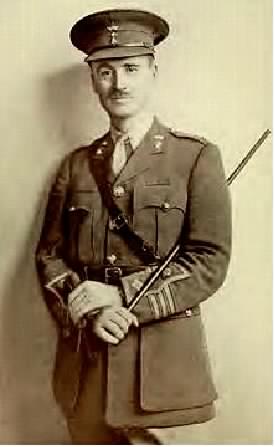
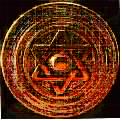
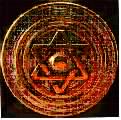
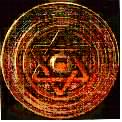
Medallion of the Zion Mule Corp
There is no exaggeration; Patterson was the commander of the first Jewish fighting force in nearly two millennia. And as such, he can be called the godfather of the Israeli army.
- Prime Minister Benjamin Netanyahu
Never in Jewish history has there been in our midst a Christian friend of his penetration and devotion.
- Vladimir Jabotinsky
Prime Minister Benjamin Netanyahu stood on the auditorium stage of the Beit HaGedudim Museum, the Jewish Legion Museum, in Avihayil. Three hundred guests filled the room. Israelis dressed in Israel casual, open shirts, even jeans. Foreign guests in suits and ties. Only one officer present was in full dress uniform, Col. Jefferson, the British Military attach from the British Embassy accompanying the British Ambassador. A projected image of Lt. Col. Patterson filled a huge screen behind the Prime Minister. The text adjacent to the picture boldly read, We salute you, Lieutenant Colonel. Patterson.
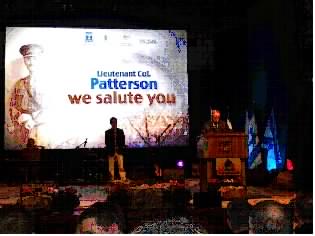
The Prime Minister spoke to all and directly to Alan Patterson, the Colonels grandson and last family. Alan sat in the front row. Prime Minister Netanyahu spoke historically. He spoke with feeling, context and emotion that came from the heart.There is no exaggeration, Patterson was the commander of the first Jewish fighting force in nearly two millennia. And as such, he can be called the godfather of the Israeli army.
It was a curious statement to those who knew nothing about Colonel Patterson. Patterson was a Christian. A Christian was the Godfather of the modern Israel Defense Forces, not a Jew.
I sat in the front row next to Alan. As the Prime Minister named a list of Israelis who helped make the return of the Colonel possible, I heard him say in Hebrew, especially Jerry Klinger. It was a surprise. I had long grown accustomed to the Israeli penchant for acknowledging few outside of themselves for accomplishments that benefited Israel. It remains an unpleasant experience of many friends of Israel to be supplanted by Israelis rushing to take credit for things they did not do. Part of the Israeli mythos, rooted in the foundation story of the country, is we did it all by ourselves.
Israel did much by itself; there is no denial of that. But without help from Christians working together with the Jews, Israel may not have come about. The return, the long overdue act of respect, honor and duty to Colonel Patterson absolutely would not have happened if it had not been for the common efforts of Israelis, Americans, Canadians, Jews and Christians who came together in common purpose.
The Colonels story, the Zion Mule Corps, the Jewish Legion, his personal high sacrifice for Zionism, for the Jewish people, why the Colonel was important, why what we were doing was importantthe Prime Minister got it right. The media pretty much got it wrong.
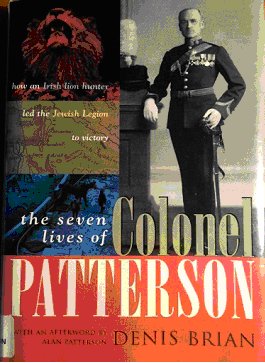
Four Years ago, I read a biography of Colonel Patterson by Denis Brian, The Seven Lives of Colonel Patterson. The Colonel lived a fascinating, almost swashbuckling life, more exciting and exotic than an Errol Flynn Hollywood movie. At the end of the biography was an afterword by Alan Patterson. Alan wrote about an obligation he had to complete his grandfathers final wishes.
The last is to organize removal of JHPs (John Henry Patterson) and Francies (his grandmother) remains and relocate them suitably in Israel. One of his last wishes was to be buried with his troops. Near the Beit HaGedudim Museum, dedicated to the Jewish Legion, there is a cemetery where many of the legionnaires are buried, and this presumably would be the most appropriate place, provided that Francie could be interred there as well. This will, I fear, entail significant dealings with bureaucrats. The Col. Was used to bulldozing through, skirting or, when essential, ignoring bureaucracy and its requirements, skill that could prove very useful to me now.
Alan was not confident that he had the ability of fulfilling the Colonels wishes. He was concerned about the fight and the focus of time needed to wade through the jungle of bureaucratic obstacles to do the job.
I read what Alan wrote. Having successfully finished the seven year struggle to rebury the abandoned and forgotten last descendent of Theodor Herzl, his grandson Stephen Norman, with his family on Mount Herzl, I understood the extreme difficulties that Alan would have to face. Ironically, Norman was the only Zionist in Herzls family. He was the only Herzl to have been to Palestine and wanted to be there. He was denied the ability to return to Palestine by the British Mandate government because he was a Herzl. Reburying him should have been a simple Zionist duty. It became a Zionist ordeal.
Fulfilling the Colonels last wishes was a debt Israel and the Jewish people owed him. I owed him. Doing the right thing did not mean it would be easy. As Alan had feared, bringing the Colonel home did turn out to be long and difficult.
A Christian friend, a Canadian admirer of Colonel Patterson, Todd Young, put me in contact with Alan. I called Alan and met him in Boston.
At Avihayil, Alan spoke before the Prime Minister did. Alan picked up the story.
In an afterword to a bibliography of JHP, I wrote that one of the tasks ahead of me at that time was the re-internment of my grandparents. Jerry contacted me as soon as he read that and offered his services. At first I was reluctant to accept, feeling that this was something that I needed to do personally. Pondering all the bureaucratic work involved in both Israel and the US, with consideration I decided that Jerry's offer was too good to turn down. And here we are.
John Henry Patterson was born November 19, 1867 in Forgney, Ireland, a small town known because it was the birthplace of poet Oliver Goldsmith. Pattersons father was a Protestant, his mother a Roman Catholic. Patterson was raised as a Protestant. He did not have any deep religious convictions. Like most young people, he read the Bible more as literature and history than theology. Not much is known about his childhood. According to Alan Patterson, JHP most likely lied about his age when he joined the British army. He may have been 17.
Coming from a family of modest means, the army was an honorable way up in the world. He quickly showed a natural ability in Military Science and was sent to officers training school. He studied and successfully graduated as an officer in the British Army. His education had an emphasis in engineering.
Patterson was sent to India. His training as an engineer would shape the course of his life.
Early in 1898, Patterson was engaged by the Uganda Railway commission to build a bridge over the Tsavo River in present day Kenya. British Imperialist goals required the construction of railways to control East Africa. They were in direct competition with German Imperialist plans. Spanning the Tsavo River was vital to the railroads progression. Patterson arrived in March of the same year. The construction of a bridge, especially difficult in primitive areas, was not an impossible project. It proved nearly the opposite.
Patterson arrived and set to work, methodically, with his objective firmly in mind. Time was of the essence. The work progressed swiftly and almost as swiftly ground to a halt. Suddenly, lion attacks began killing the workers. Lions were part of the local wildlife. Lion attacks on humans were known but uncommon. The lion attacks continued. Brazenly, the lions dragged men out of their tents at night while they slept to kill and feed on the bodies.
Traditional responses were implemented, thorny bush barriers, called bomas, were erected around the camp. Huge fires burned all night. Rigid curfews instituted. Sentries were posted. The lions cunningly were not deterred. The killings of the workers accelerated. Over a hundred men had been killed. The lions seemed to enjoy killing for the sake of killing. Fear gripped the work camp. Nothing stopped the killings.
The terrified workers refused to continue. The lion attacks were not normal. It was as if some terrible evil spirit had come into the camp with Patterson. The men began deserting the work site. Work came to halt. Pattersons authority was challenged. His career as a military engineer could be finished. The railroad faced serious financial damage. British Imperialist efforts would be dangerously delayed. Patterson, personally, was threatened by the superstitious men.
Patterson was an experienced tiger hunter from his service in India. Patterson knew he was dealing with a pair of very large animals. Night after night he would go out in search of the killer lions, only to fail again and again in locating them. Early December, he killed the first lion. A few weeks later, Patterson was nearly killed by the second lion after the wounded animal charged him. Cold courage and a steady aim brought the second beast down.
The lions were dead. They were incredibly huge beasts measuring over nine feet in length from their noses to the tips of their tails. The lion corpses were brought into camp for the men to see. It took eight men to carry each one.
Congratulations poured into the Tsavo camp from around world. The terror of the man eating lions of Tsavo was world news. Patterson, the great hunter, the man of courage, steadfastness and determination, was acclaimed everywhere, even in Parliament.
Construction of the bridge over the Tsavo River was completed in February of 1899. Patterson sold the lions skins to the Fields Museum in Chicago. The museum had them stuffed and mounted. The man eaters have been on display since 1924.
Pattersons fame and courage in the face of darkness rose to pop culture heights after he wrote a book based upon his experiences published in 1907, The Man Eaters of Tsavo. The book went into multiple printings. Three movies have been made about Patterson and the Lions of Tsavo. The most recent was 1996, The Ghost and the Darkness staring Val Kilmer.
With the completion of the bridge over the Tsavo River, Patterson was transferred to the Essex Imperial Yeomanry. He served with distinction in the Boer War, 1899-1902, earning the Distinguished Service Order and eventually his final rank, Lt. Colonel. During the Boer War, Patterson made numerous key command contacts. He would call upon the contacts later in his efforts with and on behalf of the Zionists, with extraordinary results.
Lord Elgin appointed Patterson the Game Warden (Superintendent) of the game reserves in East Africa after the Boer War. While leading a safari, 1908, for Audley Blyth, son of James Blyth, 1st Baron Blyth, and his wife Ethel, Blyth was mysteriously shot. Rumor accused Patterson of shooting Blyth over an affair with Mrs. Blyth. Witnesses testified that Patterson had not been in the Blyth tent when he was shot. Pattersons actions were investigated and he was not so much as censured. Yet, the wagging tongues continued. His reputation was forever sullied among proper British society. His career in the military did not progress. He retired from the army in 1911. Three years later World War I broke out.
Patterson volunteered and was sent to Flanders. The Blyth affair and his broken reputation followed him. He was refused a permanent command in Europe. On his own initiative and expense, 1915, Patterson traveled to Egypt where his old friend General Maxwell was in charge.
A confluence of events was occurring in Alexandria, Egypt. The Turks were in control of Palestine. They had a deep disdain for the Arab peasants of Palestine. They had a deeper distrust even hatred for the Jews who had settled in Palestine, the Zionists. The Turks feared that the Jews would side with the British in the war. With a cold hearted decision, the Turks expelled the Jews of Palestine. Most of the desperate, starving, refugees escaped to Egypt.
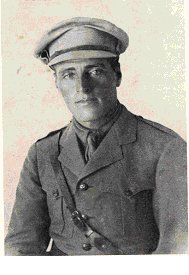
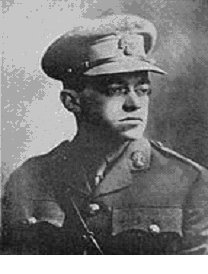
Capt. Joseph Trumpeldor Lt. Vladimir Jabotinsky
As Patterson arrived, a young Russian firebrand, Vladimir Jabotinsky, together with a one armed former Russian Tzarist officer, Joseph Trumpeldor, were organizing the refugees. Both of the men wanted to fight for Palestine, they were Zionists. Palestine was their home and they had been expelled to Egypt. General Maxwell was in desperate need of men. The character of World War I fighting was a virtual butchery shop of men.
The Jews approached Maxwell to permit them to fight with the British army for Palestine. A decision to fight for Palestine had not been made yet. Winston Churchill, the first Lord of the Admiralty had instead decided to attack the soft underbelly of the Axis powers by invading Gallipoli. Churchills objective was Constantinople and to knock Turkey out of the War.
Maxwell offered to the men that Jabotinsky and Trumpeldor were organizing a special, separate unit. It would not be a fighting unit but a support and supply unit. They all understood they had to prove themselves as mule drivers hauling supplies to the fighting units and the front lines in the coming battle. Jabotinsky was insulted. Jews were not mule drivers. They were men who would and could fight. Trumpeldor was more pragmatic. Trumpeldor told Jabotinsky, "to get the Turks out of Palestine, we've got to smash the Turk, on which front you begin smashing is a question of tactics. Any front leads to Zion."
Jabotinsky refused to join the mule team unit. Trumpeldor accepted. However, there was a problem. Who was to lead the Jewish unit? It was unthinkable, unacceptable that a British military unit should be commanded by a Jew. Unless a suitable Christian British military officer could be found there would not be a Jewish military unit even a unit of mule drivers. It was precisely at that moment that Patterson presented himself and offered his services to Maxwell.
Maxwell needed men and officers. He was not the least interested or concerned with Pattersons alleged sordid past. Maxwell offered Patterson the command.
Patterson wrote about that moment in his book, With the Zionists in Gallipoli.
- It was strange, therefore that I, so imbued with the Jewish traditions should have arrived in Egypt at the psychological moment when General Sir John Maxwell, the C-in-C in Egypt, was looking for a suitable officer to recruit a Jewish unit. A Jewish unit had been unknown for 2,000 years, since the day of the Maccabees, those heroic sons of Israel who fought so valiantly, and for a time so successfully, to wrest Jerusalem from the Roman Legions. It is curious that General Maxwell should have chosen me (to command a Jewish unit), because he knew nothing of my knowledge of Jewish history and my sympathy for the Jewish race. When as a boy I eagerly devoured the records of the glorious deeds of the Jewish military captains, such as Joshua, Joab, Gideon, Judas Maccabee, I never dreamed that I in a small way would become a captain of a host of the Children of Israel."
March 1915, Trumpeldor spoke to the Jewish refugees. In a simple message he exhorted them to volunteer.
- History is giving us an opportunity which has not been given to us in almost all the centuries of our exile. We will be the first to fight with our blood for the liberation of our land. We will be followed by thousands of other Jews.
By Jerry Klinger
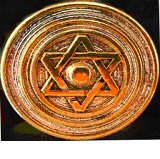
Medallion of the Zion Mule Corp
The Zion Mule Corp was organized, six hundred and fifty men strong. With the blessing of the chief Rabbi of Alexandria, they sailed for Gallipoli. They sailed with and as part of the British army opening the first step in the creation of the later Israel Defense Forces.
Gallipoli was a tragic disaster for both the British and the Turks. Over a 130,000 lives on both sides were wasted in a major failed effort to pierce the soft underbelly of the Axis powers. After many months of carnage, the British withdrew. Nothing had been accomplished. But everything had been accomplished on the road to Israel. A few mules did it.
The Zion Mule Corp distinguished itself well in the hell of Gallipoli with courage, purpose and steadfastness. They showed themselves reborn examples of biblical Jewish soldiery. They demonstrated their willingness to bravely pay with their blood, which they did in Gallipoli, for Palestine.
Patterson wrote about his men: "Many of the Zionists whom I thought somewhat lacking in courage showed themselves fearless to a degree when under heavy fire, while Captain Trumpeldor actually reveled in it, and the hotter it became the more he liked it ..."
In January 1916, the Zion Mule Corps returned to Alexandria greatly reduced in numbers from disease and casualties.
The British reneged on their recruiting promises to the Jews.
In March, 1915, Major General Sir Alexander Godley had told the prospective Jewish volunteers, Do you have it in your hearts to shake the extended hand or to reject it? Today the English people have entered into a covenant with the Jewish people Two hundred men stepped forward at that call.
When the Zion Mule Corps returned to Egypt, the British disbanded the unit.
Patterson was invalided back to London. He was severely ill.
Jabotinsky was in London pursuing his frustrating dream of a Jewish army to liberate Palestine from the Turks. He had little success with the Allies and even less success with the Jews. The Zionists, at best timid and lukewarm to the idea, feared alienating one side or the other. Jews fought on both sides of the conflict. Jabotinsky was undeterred.
Throughout the Gallipoli Campaign, Jabotinsky kept himself up on what was happening. He maintained a friendly, responsive correspondence with Patterson.
Jabotinsky was in London when Patterson arrived. He was lobbying for a Jewish Army. Lord Kitchener, the British Secretary of War, was absolutely set against a Jewish army or even a fighting unit. It did not matter that the war was slaughtering millions of men on the bloody, mud cratered killing fields of Europe. It did not matter to Kitchener how desperate the need for recruits was, he would not create a special Jewish army from the huge Russian Jewish refugee population in England. He had no problem with other ethnic fighting units in the army. He did with a Jewish one. Kitchener would not reconsider.
Jabotinsky leaned that Patterson was in London recuperating. He wrote to Patterson and went to see him. Patterson asked Jabotinsky how goes it?
Frustrated and nearly despondent, Jabotinsky told Patterson what had happened to the Zion Mule Corps after his departure from Egypt. The Corps was disbanded. The men were given the option of enlisting in the British army and being dispersed throughout Europe. The promise given them, to fight for Palestine as a Jewish unit gone. Trumpeldor was also in London, Jabotinsky told Patterson. Trumpeldor was holding together a small core of men from the Zion Mule Corps who wanted to stay together. Kitchener would have none of it.
Presciently or perhaps prophetically, Patterson reflected to Jabotinsky
"Realities are stronger than Lord Kitchener," he said.
Jabotinsky asked for Pattersons help.
Without a moment of hesitation, Patterson said yes.
A few days after their meeting, June 5, 1916, Lord Kitchener sailed for a high level meeting with his Russian counterpart in the war. Kitcheners ship hit a mine and sank. They never found his body. The enemy of the Jewish Army was dead.
Within a week Patterson had made the necessary arrangements. Jabotinsky came to the home that Patterson was recuperating in. They ordered a cab and went to Parliament. While Jabotinsky waited in the Hall, Patterson wrote out a quick note and gave it to the guard. A few minutes later, a short man in a smart Captains uniform came out. Patterson and the Captain shook hands. They knew each other well from the Boer War and Gallipoli.
Patterson introduced Jabotinsky to Captain Leopold Amery.
Addressing Jabotinsky, Patterson said, Captain Amery knows of our project. Give him the latest update.
Amery listened intently to Jabotinsky. He was sympathetic to the Zionist ideal of a Jewish Army. Because of Patterson, Amery was a strong supporter of the Jewish Legion and Zionism but for different reasons. Amerys primary motivation was to use the Jews to help Britain wrest control of Palestine from the Turks for Britain.
Guiding Jabotinsky through the British ruling governmental maze, Amery brought Jabotinsky to Lord Derby, the new secretary of War. Derby had replaced Kitchener after Kitchener was killed. Derby supported the Jewish Legion idea. He assigned General Geddes to direct recruiting and arrange for the formalities of a Regimental uniform and identifying badge as a Jewish unit.
The Jewish Legion was born.
General Geddes worked closely with Jabotinsky in the process. He asked him who he would recommend to command the Regiment. Geddes had already asked Patterson for his opinion. Patterson declined recommending that a Jew should be in command. Jabotinsky thought differently. Jabotinsky understood there was only one man who had the fight, the needed political moxie, the British bulldog determination to face down the anti-Semites in the military and hardness needed to mold the fractious Jews into a cohesive fighting unitPatterson. Jabotinsky did not wait to respond.
There is only one nomineeeven though he is not a Jew, he must be our colonel, and I hope that one day he will be our general: Patterson.
Patterson accepted the command, July 27, 1917 and set to work.
With the approval of the Jewish Legion, opposition by the assimilationist British Jewish establishment swung into high gear. Lionel de Rothschild and Lord Swarthling joined forces to pressure Derby to cancel the Legion. Derby wavered but compromised by removing the name Jewish and anything that suggested the unit was Jewish. He changed the name from the Jewish Legion to the 38th Royal Fusiliers.
Patterson was energetic in his recruiting efforts within the large Russian refugee Jewish community in Britain. He assured them that the unit was a Jewish unit going to fight for Palestine. Russian Jewish refugees were not going to send their sons to fight and possibly die in the bloody fields of Europe to save Britains ally the hated, rabid, anti-Semitic Tsar. They would send their sons for Zion.
Patterson felt betrayed. He felt he had lied to the people he was trying to recruit for the Legion. He would not get men to follow him by lying to them.
Chaim Weizmann and now Major Amery swung into action. They went to see Lord Milner who was a member of the War Cabinet. Milner had a long, heart to heart, talk with Derby.
Jabotinsky sought out the editor of the influential paper, The Times. The Times printed an excoriating editorial of Derby and the War Cabinet supporting Pattersons reasons for resigning.
Derby backed down. Patterson stayed as the regiments Colonel.
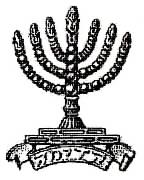
Derby assured the recruits, Patterson and the regiments supporters, they would only be sent to fight for Palestine. If they proved themselves on the battlefield, they would earn the official title of the Judean Regiment with the Menorah as their regimental badge. Until that point in time, they would be known as the 38th Royal Fusiliers.
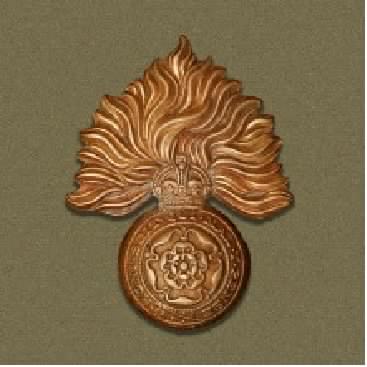
- Badge of the Royal Fusiliers
By Jerry Klinger

- Badge of the Royal Fusiliers
Throughout the army, the 38th Royal Fusiliers were known as the Jewsiliers.
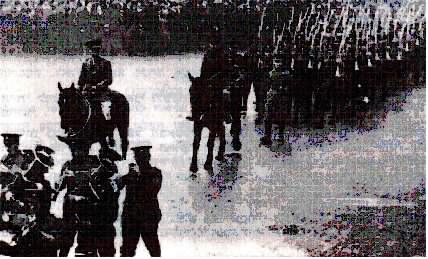
Col. Patterson and the 38th Royal Fusiliers
Nearly 1,000 men of the 38th departed for Egypt and destiny, February 1918. The precedent of 38th formation set the stage for the creation of the Jewish Brigade in World War II. From the Jewish Brigade of World War II came the officers and trained leadership that became the core of the Israel Defense Forces of modern Israel.
Patterson astutely knew who to go to for help to make the Jewish Legion a reality. Jabotinsky, despite all his might and energy, could not and did not get it done. Patterson was the key, the catalyst, the man who knew how to do and was willing to do what needed to be done.
Patterson did what no Jew could do.
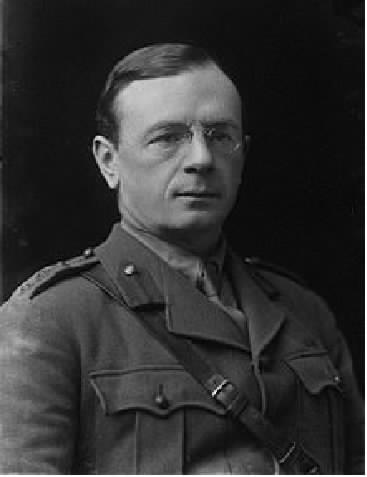
Leo Amery
Leo Amery was the influential voice behind the throne fighting British establishment Jewry when they almost quashed the birth of the Legion.
Later, Amery became assistant secretary to the Balfour government. Amery most likely wrote, or had a significant role and influence in the writing and passage of, the Balfour Declaration.
Amery was raised as a Christian. His mother was Jewish. His Jewish parentage, and by definition of matrilineal descent Jewish identity, was a fact kept hidden until very late in his life. Amerys supposed Jewish identity had little to do with his actions for Britain. What was good for Britain was his concern, not what was good for the Jews. Patterson was different. He too loved Britain. Patterson did what he did for his men and for the Jews because he felt it was the right thing to do.
Amery went on to serve many years as an MP. He would become first Lord of the Admiralty and Colonial Secretary under Baldwin with an oversight over Palestine during the 1920s. Amery was a deep admirer of Neville Chamberlain. His son, John Amery, became an open supporter of Adolf Hitler and Nazism. He broadcast Nazi propaganda from Germany to Britain. John served in the Nazi Wehrmacht British Free Corps. He was executed for treason after the war.
Patterson led the 38th Royal Fusiliers across the Sinai Desert towards Gaza. They saw their first action June 15, 1918. Over and over, the Jews fought well, with courage, honor and dignity. Soon they were virtually fighting outside the walls of Jerusalem. In the fall of 1918, the 38th attacked the Umm-es Shert ford. They routed the Turkish defenders who were multiple times their size. The 38ths action, upon whom much of Allenbys right wing movement depended, permitted the First Australian Light Horse Brigade to cross safely. The combined movements were the key. October 31, 1918, the Turks surrendered. Palestine, all of Palestine, from Gaza to and including modern Jordan had been liberated.
Theodore Roosevelt knew Patterson from his days as an East Africa game hunter. He wrote to him.
To have the sons of Israel smite Ammon on the hip and thigh under your leadership is something worthwhile.
General Chaytor, commander of the First Australian Light Horse also wrote to Patterson about the bravery of the Jews.
So few have heard of the Battalions good work or of the very remarkable fact that in the operations that we have finally opened Palestine to the Jews, a Jewish force was fighting on the Jordan within a short distance of where their forefathers under Joshua first crossed into Palestine, and all who hear about it are anxious to hear more. I shall always be grateful to you and your Battalion for your good work while with me in the Jordan valley. The way you smashed up the Turkish rearguard when it tried to counterattack across the Jordan made our subsequent advance up the hills of Moab an easy matter.
If there was a dirty job, the 38th was posted to it. No matter how bad the situation, the men did their duty. Patterson was proud of them. He was proud of the unit and did not tolerate disrespect to the 38th from anybody whom he felt was motivated by anti-Semitism.
Patterson defended his men. He fought for them. Simple things such as supplies, proper medical care, and even kosher food required Patterson to fight on behalf of his Jews. Fight he did.
When an anti-Semitic Brigadier, Brigadier General Edwards, suddenly showed up for a review of the men, it did not develop well. The Brigadier called a young soldier a dirty Jew because he felt a button on his tunic was not properly shined to his liking.
Patterson ordered his men to fix bayonets and surround the Brigadier until he apologized. The Brigadier complained to higher ups. He was quickly transferred to India. Patterson was reprimanded.
After the 38th had been deliberately stationed in a malaria infested area of the Jordan valley, the battalion was reduced to 150 men who could still fight. Again, they were refused proper medical attention. Patterson tendered his resignation. HQ would not accept. Patterson, his reputation and the press were a dangerous combination for the military command.
Certain individuals at GHQ had no desire to see me land un-muzzled in England. I would at once let the authorities there know that their representatives in Palestine were not carrying out the declared policy of the Imperial Government, but, on the contrary, were doing their best to make of the Balfour Declaration a mere scrap of paper.
Patterson sent in five recommendations to improve conditions. None were implemented.
After the British victory, without regard to the Balfour Declaration, the situation for Jews in Palestine did not significantly improve.
March 1919, Arabs attacked Jewish settlements. The British did nothing. Soldiers of the Legion deserted their camps, requisitioned on their own weapons from British stockpiles and drove off the Arabs. Massacres were prevented. The British military responded to the Jewish action. They accelerated the demobilization of the Jewish Legion. As many as possible, as quickly as possible, were sent away from Palestine.
Anti-Semitic assaults on his men were felt personally by Patterson. During Passover 1919, General Bols, a rabid anti-Semitic officer whom Patterson clashed with repeatedly, acted with pure vindictiveness. Bols would become the first military governor of Palestine under the British. Bols prevailed upon General Allenby to keep the Jewish soldiers of the 38th and the later newer Jews units of the 39th and 40thRoyal Fusiliers, away from Jerusalem.
Patterson wrote:
Jewish soldiers for the first time in their lives in Palestine and barred from the Temple Wall of Jerusalem during Passover! Only a Jew can really understand what it meant to these men, and the strain it put on their discipline and loyalty. How provocative and insulting this order was will be better understood when it is realized that the majority of the population of Jerusalem is Jewish, and therefore there could have been no possible reason for excluding Jewish troops belonging to a British unit, while other British troops were freely admitted, more especially as the conduct of the Jewish soldiers was at all times exemplary. Not since the days of Emperor Hadrian had such a humiliating decree been issued.
Lt. Colonel Patterson was not endeared to the British high command in Palestine. He was too close to his men for their taste. The 38th was demobilized and Patterson retired from the military in 1920. He was the only front line officer in the British army during World War I who was never promoted.
Patterson returned to England, to his wife and son. Through his association with the Jews of the Legion, Patterson had become an ardent Zionist. He continued writing and speaking out on behalf of Zionism.
By Jerry Klinger
Post war, British anti-Zionists began to weaken the Balfour Declaration. Palestine was portrayed by them as barren, sparsely populated, in desperate need for drainage and irrigation. It could not sustain even the tiny Jewish and Arab populations that were there little less permit more Jewish immigration.
Patterson responded:
In Palestine there was room to spar, for many years to come for both Jew and Arab. The hope of the Jewish people rest in the soil The barren hills must once again be terraced and planted with vine, fig and olive. Under Jewish land management and modern farming techniques, the land began to come back. Jewish energy and Zionist focus were bringing Palestine back.
The Arabs renewed attacks on Jewish settlements in 1920. Patterson became convinced that the best stewards of the land for the betterment of both Arabs and Jews were the Jews. He had maintained a close relationship with one of his lieutenants of the 38th, Vladimir Jabotinsky. Patterson became a confidant of Jabotinsky whose political life as a Zionist leader and visionary was dramatically rising.
At Jabotinskys request, Patterson traveled and spoke on Zionism, Palestine, and the Jewish Legion. Two very important draws for the Zionists of Pattersons help was his mass cultural appeal as the famous Lion of Tsavo hunter and second, the fact that he was not Jewish. He was a Christian advocating for the Zionists. His statements about Zionism, Palestine and Jews were given greater credence precisely because he was not Jewish.
Patterson was a no nonsense observer of American Zionism during his travels to the States speaking for Jabotinsky. He observed in a 1922 letter to Chaim Weizmann:
After having traveled this great land of the stars and stripes and having met various shades and brands, both of the Orthodox and the Reformed element, I have come to the conclusion that the former are anxious to hear the message from Palestine, are anxious to help in rebuilding the old land, and are anxious to see it once more green and Jewish. But the Reformed Jews on the whole care for none of these things. Palestine is not yet fashionable enough for them; but you might possible arouse their interest in the land of their Fathers, if you could arrange for a delegation composed of the Archbishop of Canterbury, Cardinal Gaspari and say, Lord Rothschild!
Zionism would not become generally fashionable for the bulk of the American Reform movement until after the full extent of the Holocaust was understood. There were some notable exceptions such as the influential American Reform Rabbi Abba Hillel Silver. The Reform dominated anti-Zionist American Council for Judaism (ACJ), still functioning today, is a fraction of the size and influence that it was in 1945. The ACJ urged President Truman not to recognize the partition of Palestine and the creation of the State of Israel. Anti-Zionism, or Pro-Palestinianism, is on an ascendency among contemporary younger American leftist Jews.
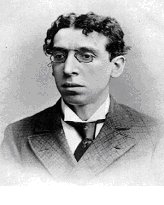
Israel Zangwill
Israel Zangwill, the famous British Jewish writer and controversial Zionist described Patterson in 1923:
- "A man of the simplest and most loveable character, imperturbable, breezy, hopeful and humorous, a crusader in a truly Christian Spirit, whose aim is to restore Palestine not to Christendom, but to the only homeless people on earth. Colonel Patterson has written his name indelibly on the scroll of Jewish as well as British history."
In 1930, Jabotinsky went to South Africa to speak on Palestine and raise funds for Zionism. The British barred him from returning. He needed eyes and ears on the ground in Palestine. He turned to Patterson. Three years later, at the Arlosoroff murder trial in Tel Aviv, when members of Jabotinskys political group were accused of murdering Haim Arlosoroff, it was Patterson who was sent to observe and report back on the trial to Jabotinsky.
Patterson was everywhere on behalf of Zionism. 1936, Patterson traveled to South Africa to raise money from the large Jewish community there for the establishment of a new moshav (a cooperative farm project) located near Netanya. The moshav was founded by members of the Jewish Legion. It was named Avihayil My Father was a Soldier. Patterson visited the moshav. He was received as a hero.
Tensions between the Arab community and Jewish community of Palestine were always troubled waters. Patterson put much of the long term conflict between the two communities firmly on the heads of the British Mandate Government. He especially blamed his old nemesis from the Jewish Legion days, General Bols who became the first military governor. Bols selected and embedded lower level administrators who remained for many, many years shaping Palestine after the League of Nations established the British Mandate over Palestine. Bols, Patterson felt, chose men not for the competence or even pro-Arabs views but more for their anti-Semitic feelings.
Patterson wrote after the Arabs again rioted in 1936 reflecting on Bols Palestine legacy:
- "An out and out anti-Semite who would leave no stone unturned to destroy, root and branch, the Jewish National Home. What was promised to the Jews (by the Balfour Declaration) must be given to them. Let the Arabs do what they like with their own countries, but Palestine, the whole of Palestine, is a Jewish country in which they must be able to work out their salvation."
The dark clouds of horror began fill the skies of Europe in the 1930s. Establishment Jewry remained quiescently timid. The British Mandate government turned their back on the scrap of paper called the Balfour Declaration. Desperate Jews searching for a safe haven, any haven for themselves, their children found the doors of Palestine closed to them. The British had surrendered to Arab blackmail in a rehearsal of Neville Chamberlains peace in our time blinders. They did not care about Jewish life.
Jabotinsky did. Patterson did. Jabotinsky went to Poland and railed, pleaded, begged Polish establishment Jewry to listen to what was being said by Hitler. He warned that words do matter as much as the threatened deeds. Palestine was their only hope. With months before Hitler invaded Poland in September of 1939, Polish Jewish leadership rejected Jabotinskys call.
Patterson was sent back to the United States. He continued speaking, seeking money, but his message changed to what he had called during the Great War, a Jewish Army. A Jewish Army was needed to face the existential threat of Nazism. American establishment Jewry rejected the message. They were afraid of antagonizing President Roosevelt. American Jews, most of whom were only second generation Americans, were very insecure in the identity. They wanted to remain low to the ground and not visible, assimilating into American life, much like the British Jews did when the call for the Jewish Legion went out. American Jews were afraid that the Jewish Army message would be turned on Jews. The Jews wanted war so that Christian blood would spill fighting the Nazis to save Jewish skins.
Pattersons message was simple and direct. The Jews have a right to defend themselves. It was a message he had used when speaking about Palestine and the Arabs. While Jabotinsky spoke in Poland, Patterson spoke in the U.S. He co-founded the American Friends for a Jewish Palestine and issued a special appeal to American Jewry.
- "On the Irgun, the Jewish National Military Organization of Palestine, rests much of the responsibility for the protection of Jewish life and property today. Its service to Palestine Jewry in years past has been inestimable and on many occasions when British security measures failed, it came to the rescue and saved many dangerous situations. The Irgun today is badly in need of financial assistance and I would urge you with all my heart that American Jewry now come forward and provide generously for the wants of this invaluable force. Do not let the bloody Swastika Wave over Jerusalem.Eight million Jews enslaved under the Hitler yoke place all their hopes for life and salvation in you Free Americans! Deliver Jewry from slavery and extermination in Europe. Destroy the gates of the Ghetto, by THE FORMATION OF A JEWISH ARMY which will battle alongside England and the Allies, to defend Palestine, Jewish honor and the most sacred principles of democracy.
The Jewish Army will become a reality if everyone does his duty.
Passivity is the cause of the Jewish national tragedy, therefore become active and join the movement for a Jewish Army.
We await your helping hand. Call our office immediately!"
Patterson's American Jewish response was modest. He returned to London.
It was early 1940. War was a reality.
Jabotinsky and Patterson worked through the winter in London lobbying the British government for a Jewish army. They were turned down, repeatedly.
The young 28 year old, personal secretary of Jabotinsky read the writing on the wall better than Jabotinksy had. He was part of a group, Dr. Benjamin Akzin, Lord Lothian, and Elias Ginsburg along with Patterson and Jabotinsky desperately pushing the IRGUNs themes to no avail in Britain. He encouraged Jabotinsky that the mantel of leadership had left Britain. Jewrys future and salvation lay across the Atlantic, in America.
Jabotinsky resisted the appeal from the young man. He thought about it for a few days and decided. Colonel Patterson and his young personal secretary would relocate Jabotinskys political center from London to America. They should leave as soon as possible. The young personal secretarys name was Dr. Ben Zion Netanyahu, a historian of the Spanish Inquisition. Ben Zion Netanyahu would become the father of Benjamin Netanyahu, the Prime Minister of Israel. Patterson was an active, focused man of 72. He left immediately for New York.
Patterson wrote to Lord Lothian from the United States, June, 1940.
- "During the last war, when our fortunes were at a low ebb, Mr. Lloyd George had the brilliant idea of bringing the Jewish people to our side by creating a Jewish Legion and solemnly promising Palestine as their national homeland. On 6th of March last, Mr. Chamberlain did just the opposite. He forced an act through Parliament (Mr. Churchill opposing him) devouring Israels heritage. Chamberlain paid no heed either to Englands honor or the bibles ominous warnings you will find it in the second chapter of Jeremiah and the third verse, all that devour Israel shall offend: evil shall come upon them saith the Lord. Lord Lloyd, and his pro-Nazi minions in the Colonial Office, have had their way and defeated the Jewish army scheme. (Lord Lloyd, the British colonial secretary, responsible for Palestine, was ant-Zionist and a pro-Arab supporter of Oswald Mosleys British Union of Fascists, at whose meetings he lectured.) But they have also brought England another step nearer her doomYou may rest assured if England continues her anti-Jewish policy, England will be destroyed. I have seen this coming for years and have fought against it tooth and nail because I loved England and hated to see her betrayed by a gang of pro-Nazi, neo-pagan permanent officials They, together with the brainless, spineless MacDonalds, Baldwins, and Chamberlains, have led her into the present perilous situation.
Dont be afraid to tell Churchill. He is strong. A Jewish army and a Jewish Palestine would be of immense service to England The fate of England may be in your hands. Make use of every lever that will help. Please make no mistake-one Jewish mechanized division would be worth more than all the Arabs in the Near East."
Jabotinsky came to the United States during the summer of 1940. He was reviewing a Betar Youth Camp in upstate New York when he had a massive stroke. He was 59 years old when he died. It was a serious blow to Patterson. He served as one of the pall bearers.
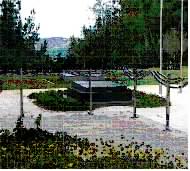
Jabotinsky gravesite, Mt. Herzl
Jabotinsky was buried in New Yorks New Montefiore Cemetery. Sixteen years after the establishment of the State of Israel, 1964, Prime Minister Levi Eshkol arranged for Jabotinskys reburial on Jerusalems Mount Herzl National Cemetery. He was buried in a section reserved for national leaders. His resting place is deliberately sited between Theodor Herzls tomb and Israels national memorial museum to the Holocaust, Yad Vashem. Annually, a memorial service is conducted at Jabotinsky's grave.
Patterson's support for Zionism did not rest after his friend of twenty-four years died. Whenever and wherever he was needed to speak or be part of an effort on behalf of Zionism, the Jewish people and the Jewish army, he was there. He associated with the controversial Bergson group who rubbed establishment American Jewry the wrong way calling for action as the Jews of Europe burned. His call was always the same, a Jewish army, the Jews have a right to fight and defend themselves.
Patterson was 75 in 1942, still ramrod straight and thin as a razor. In the few years he had been in America, he had an incredible list of efforts he tied himself to, enough to have killed off a much younger man.
He was co-chair with Pierre Van Passen, of the Committee for a Jewish Army for Stateless and Palestinian Jews, founder of the American Friends of a Jewish Palestine, chairman and military adviser of the Committee to Save the Jewish People of Europe, chairman of the American Resettlement Committee for Uprooted European Jewry, president of the New Zionist League of America, supporter of the Emergency Committee to Save the Jewish People of Europe, and a member of both the Jabotinsky Publications Committee and the American Palestine Jewish League.
Ben Hecht, the famous American playwright and key member of the Bergson Group, amazed at Patterson wrote: that the cause of justice to the Jews should burn so brightly in the heart of a Britisher who was no Jew Colonel Patterson.
Ben Zion Netanyahu was the editor of the IRGUN publication. He did a special issue on Patterson writing about him in an editorial: the fighting Irishman who gave up the best of his life for the redemption of the Jewish people an outstanding example of a righteous man of the world.
Establishment American Jewry feared the activists of the Bergson Group. They feared Pattersons strident repeated efforts for a Jewish Army. They brought Patterson to the attention of J. Edgar Hoover, the director of the FBI because of his calls to arm the Palestinian Jews.
Patterson was the lightning rod. He continued saying the things that Jews could not and he could say it with authority. It made many uncomfortable.
October of 1943, he bluntly stated what was known but hidden by fearful political correctness about Arab involvement in the First World War.
- "I can vouch for the fact that the Palestine Arabs never lifted a finger to help the alliesThe Arabs outside, under Feisal, and Lawrence (of Arabia), gave a somewhat nebulous support for our extreme right flank far beyond the Jordan, but, according to Lawrence himself, even this assistance was but sporadic and only obtained by heavy payments in gold millions of pounds sterling to the Arab Sheiks. The Jews, on the contrary, gave thousands of their men, and millions of their money to help the Allied cause to victory."
Patterson's wife, Frances, health, never very good, began deteriorating seriously in 1945. She suffered from crippling arthritis and needed personal care. Patterson did what he could but he had little funds to help her or himself. The British Government had cut off his meager pension for the war years on a technical funds transmission issue. He was virtually penniless.
Mr. and Mrs. Marion Travis of Bel-Air, California, respectful of all that Patterson had done for Zionism and the Jews, took the Pattersons in. They lived in a small bungalow on their estate, care was provided as needed.
Patterson still traveled as he could for Zionism. In 1946, he crossed the United States to Philadelphia. Ben Zion Netanyahu and his wife Celia had just had their first child. It was a boy. They asked Patterson to come.
The Netanyahus so admired Colonel Patterson, they asked him to be a co-sandek, a Godfather of their new born son, along with Celia's father Nathan. The child was named Yonathan, Jonathan, in honor of both men. Patterson presented the infant with a silver cup inscribed, To my darling Godson, Jonathan, from your Godfather, John Henry Patterson. The cup is a treasured family heirloom of the Netanyahu family today.
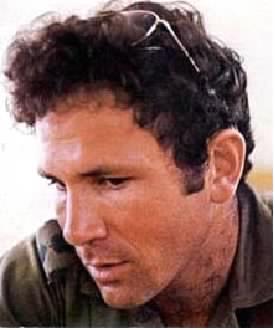
Yoni Netanyahu
Yonathan, Yoni, as he was nick named, grew up to be a Commander in the Israel Defense Forces. He was a natural leader of men and a fierce defender of Israel and the Jewish people. July 4, 1976, in a mission of incredible heroic proportions, after Palestinian terrorists hijacked a commercial airliner to Entebbe Uganda, Israel responded. The Palestinians separated out the Jews and threatened to kill them unless their demands were met. The Israel Defense Forces chose Yoni to lead a daring commando mission to free the hostages.
Flying two thousand miles, Yoni led his men in a surprise attack. The hostages were freed. The terrorists were killed. There was only one casualty on the Israeli side. Yoni Netanyahu had been killed. He was buried on Mount Herzl. Israel and the Jewish people celebrated the rescue of Jews from certain death by Jewish defense forces. Israel and Jews wept at the death of Yoni. The world was amazed.
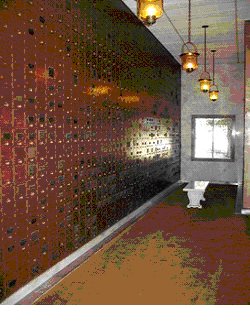
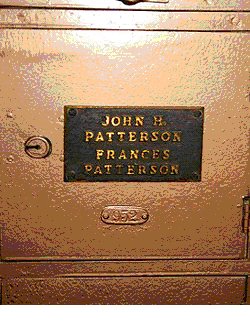
1947- interment of John Henry Patterson, lower middle column
Patterson returned to California. His health continued to deteriorate. A few months shy of his 79th birthday, and almost ten months before the birth of the State of Israel, John Henry Patterson died, June 18, 1946. He passed quietly in his sleep. Francie died six week later. Their bodies were cremated and interred modestly in Los Angeles Angelus-Rosedale Columbarium.
When Patterson died not one newspaper eulogized his passing. Prime Minister David Ben Gurion, who had served in the Jewish Legion, never mentioned Patterson, not even in his autobiography. Ben Gurion was not atypical of politicians interested in the promotion of their own legacy, their own memory. He was not interested in promoting Pattersons role because without Patterson, Ben Gurion would have been at best a footnote of obscure history.
Things were moving very fast after the birth of Israel. There was little time to focus on the dead. It was to the living that attention was paid. It was to the defense of newborn Israel by Jewish defense forces faced with extermination by seven invading Arab armies intent on Jewish death that attention had to be paid.
The Patterson's resting place slipped into forgetfulness for sixty-seven years. His final wishes unfulfilled. The respect, honor and dignity they deserved undelivered.
By Jerry Klinger
When Patterson died not one newspaper eulogized his passing. Prime Minister David Ben Gurion, who had served in the Jewish Legion, never mentioned Patterson, not even in his autobiography. Ben Gurion was not atypical of politicians interested in the promotion of their own legacy, their own memory. He was not interested in promoting Patterson's role because without Patterson, Ben Gurion would have been at best a footnote of obscure history.
Things were moving very fast after the birth of Israel. There was little time to focus on the dead. It was to the living that attention was paid. It was to the defense of newborn Israel by Jewish defense forces faced with extermination by seven invading Arab armies intent on Jewish death that attention had to be paid.
The Patterson's resting place slipped into forgetfulness for sixty-seven years. His final wishes unfulfilled. The respect, honor and dignity they deserved undelivered.
~ ~ ~ ~ ~ ~ ~ ~ ~ ~ ~ ~ ~ ~ ~ ~ ~ ~
How was the Colonels last request fulfilled? The story certainly lacks the breath or color of the Colonels life. Stories behind the events are usually forgotten, at best dull footnotes. The story of the Colonels return is a little window, a very little window, into the changed and changing world of Zionism and Israel. Perhaps, the first question anyone should ask is, why did it take 67 years to do what was right?
~ ~ ~ ~ ~ ~ ~ ~ ~ ~ ~ ~ ~ ~ ~ ~ ~ ~
- August 31, 2010
Dear Findagrave member,
My name is Jerry Klinger.I was very excited to note that you created a page for Col. John Henry Patterson. At the end of the bio - you noted that his remains were cremated along with his wife and transported to Israel. I am researching his life. Can you tell me the source of the information and who Marion Travis of Bel Air was?
Todd wrote back.
- Hello Jerry...nice to meet you.
Funny you wrote me today, I just happen to be home (under the weather). Where are you located? (I'm in Toronto, Canada).
What brought the Colonel to your attention? I get a lot of inquiries about this bio...including some from Israel.
FYI, I am no historical expert by any means, just somebody who found the Colonel to be an interesting man who I wanted to know more about. Most people know him from the 1996 movie "The Ghost and the Darkness", which says nothing of his life after 1898 when he completed the bridge at Tsavo.
You can find reference to the return of Col. Patterson's cremated remains (along with those of his wife) being sent to Palestine (now Israel) on page 174 of the book "Mad for Zion: A Biography of Colonel J.H. Patterson, published in 2004 (in England) by Patrick Streeter
The book lists no location for the remains, and I believe I took the reference of the location being unknown from an internet reference
As to the reference to Marion Travis - the Travis's were a wealthy Lithuanian Jewish family who resided in Bel Air, California. They were friends of the Colonel and Marion (one of the family daughters) offered Col. Patterson a room in their home during the final three years of his life, as his wife was now in need of permanent nursing home care and he was 77 years old with health issues.
Hope this information is helpful to you. It has been a pleasure to confer with you on this Jerry, and I wish you the all the best in your research. If you have any other questions, please don't hesitate to ask.
Best Regards,
Todd Young
I wrote back:
- Greetings Todd,
Thank you for the quick response. My interest in Patterson came because I was looking for subjects to write about for the Jerusalem Post Christian Edition. I write for them. Patterson's life is one of those that are bigger than life.Perhaps the thing that brought his life in dramatic moment for me was in Jerusalem when I looked at the King David Tower rampart that General Allenby stood upon when he formally took possession of Jerusalem in Dec. 1917.
Kevin Crombie, wrote about that moment in his book, Anzacs, Empires and Israel's Restoration 1798-1948. (Ironic, it was the story of the British response to the Balfour Declaration over the next thirty years.) "While all these proceedings were taking place, a young New Zealand soldier, Louis Salek (he was Jewish), carrying a Zionist flag given to him by Jewish people in Cairo prior to his departure, ascended to the top of the Tower of David. There he daringly flew the Jewish flag to be seen by all. It was greeted with enthusiasm by the Jewish observers and with disdain and anger by the Moslem, and was quickly taken down by order of the British Authorities. It violated the guidelines laid down by the War Office. This was quite an amazing day to complete the day's proceedings: A New Zealander from the uttermost ends of the earth, wearing an Australian uniform, and flying the Jewish flag from the Citadel of David - the very building left standing by the Romans in 70 CE. to testify to the end of Jewish national life in the Land of Israel.
Patterson was a key part of Allenby's senior leadership as commander of the Jewish Legion.
The ins and outs of history are fascinating to me. I am involved with a number of projects in Israel, curiously, because of an interest in final resting places, from the Exodus '47 and Rev. John Stanley Grauel, to Reverend William Hechler, to Captain Stephen T. Norman, to Rev. William E. Blackstone, amongst others.
I did not know of the Mad for Zion book and will try to obtain a copy. I ordered a copy of a 2008 history of Patterson this morning (The Seven Lives of Colonel Patterson: how an Irish lion hunter led the Jewish Legion to victory by Denis Brian), as well as Pattersons two books on the Gallipoli experience with the Zion Mule Corps and the later Jewish Legion book. The issue crossed my thoughts, where was his resting place? Where did his cremains finally end up? Who honored him, why did he choose Israel, on and on. Each question led to another question Imagination gets carried away with a romanticization of the story vs. the reality of present day politics.
Thank you for efforts and responsiveness,
Jerry
The Denis Brian book came. I read it and Alan's afterword.
My friendship and partnership with Todd began.
Contacting Denis Brian, I asked, how can I reach Alan Patterson? Denis had no idea. Explaining the problem to Todd, he search and located a probable email for Alan. He reached out to Alan first. Then I wrote to Alan explaining that I knew how to help him with his final responsibility to his grandfather and grandmother. We met in Boston, Alan's hometown. Alan gave me the go ahead. He only had a vague idea where his grandparents cremains were. He had been to the cemetery only once as a small child.
Todd and I worked closely together over the years ahead, a Jew and a Christian in common purpose. First, we needed to locate the cremains. It was Todd's sleuthing that found them in Los Angeles. He thought they might be at the Angeles-Rosedale cemetery in Los Angeles. I called the cemetery director, Karen Washington and asked. She looked up records and confirmed that the Colonel and Mrs. Patterson were indeed there.
I flew to Los Angeles to obtain a copy of the last will of Colonel Patterson from the Los Angeles Department of Records, meet Karen Washington and see the location of the cremains.
The Israeli link needed to be forged.
Beit HaGedudim is located in the Moshav of Avihayil.
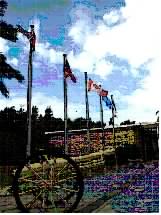
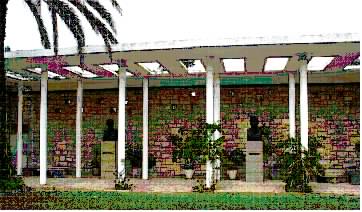
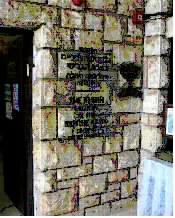 Jewish Legion Museum Beit HaGedudim
Jewish Legion Museum Beit HaGedudim
The museums approach is lined with World War I artillery pieces. The courtyard has two bigger than life busts, one of Vladimir Jabotinsky the second of Joseph Trumpeldor. The first exhibit, upon entering the museum, is of Colonel Patterson. The Colonels dress uniform complete with his sword that Alan Patterson had donated honorably presented. Nearby is a life sized display of the Zion Mule Corps.
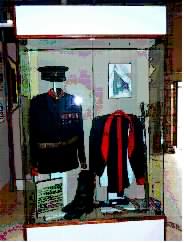
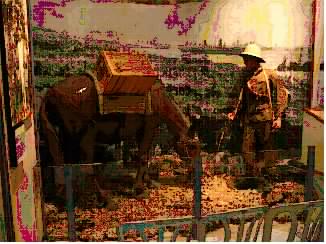 Pattersons Uniform Zion Mule Corps exhibit
Pattersons Uniform Zion Mule Corps exhibit
Rachel Silko is the director of the museum. I spoke with her at length about the effort asking for help.
It took a while. Rachel got back to me with the name of Ezekiel Sivak. Ezekiel was indeed a key contact for the Moshav. He made some preliminary inquiries and said that the Moshav might consider the re-interment of the Colonel. I flew back to Israel to meet with Ezekiel as soon as possible.
Ezekiel lives on the Moshav. They have a lovely single family home graced by huge trees that must have been planted when the Moshav was founded. His wifes grandfather was an officer under Patterson. Sitting on his rooftop veranda with a view of the Judean Hills just seven miles away, we discussed the project. Ezekiel was a kindred spirit. He too recognized the significant opportunity to bring the final respect and fulfill a debt of honor to Colonel Patterson could be.
Ezekiel became the Israeli counterpart for the Patterson project. With unending zeal, focus, sacrifice and determination, he dedicated himself to it. The project never could have been completed without him.
Ezekiel felt very strongly that the reburial of the Colonel should not occur without the Prime Minister being present. I was more circumspect.
Things did not go smoothly or quickly. There were repeated bumps, starts, stops and near disasters over the years. Slowly, painfully slowly, progress was made.
I built coalitions of interest and support for the effort outside of Israel among tribal and non-tribal members. Ezekiel worked inside of Israel.
To ease the problems of communication and operation, Alan gave me his power of attorney in November 2013. It was an important level of trust. It made all the difference.
Ezekiel broke through in Israel. February 2014, the Prime Minister signed on to the project. He assigned Ronen Peretz from his office to the effort.
American Jews and Israeli Jews are all part of the same tribe. It can be frustrating because of cultural differences. Americans are used to immediacy and responsiveness. Israelis can be insular, myopic, and frequently uncommunicative.
I returned in March. Two objectives needed to be clarified. They were not being addressed any other way.
The Patterson project was multidimensional from my perspective. It opened up doors of opportunity internationally that Israelis could not or would not grasp for a number of reasons.
Over the years, I have periodically written about Christian Zionists who have been central to the creation of Israel. The stories I wrote about in the pages of the Jerusalem Post and the Jerusalem Post Christian Edition shared how some Christians played key roles, catalysts, in the creation of the modern state of Israel. Writing for a Christian Zionist magazine was a curious situation for me. I had been a Yeshivah student. My parents were Holocaust survivors. And I had served in the IDF.
My discovery of Christians was exactly that a discovery. Like most Jews, I little knew about Christians. The one and only lesson I had gotten at home and from the Rabbis about Christians was stay away. Perhaps, God decided otherwise for me.
Emek Refaim Street runs through Jerusalems German Colony. There is a Christian Cemetery along the street at a T junction with Rachel Emot. It is the Alliance Cemetery.
Cemeteries are outdoor museums. Understanding how a society remembers its dead is a portal on how that society honors its past and defines its values. The gates to the Alliance were almost always closed. One evening they were open. Not being a Cohen, I went in and discovered the gravesite of Reverend John Stanley Grauel.
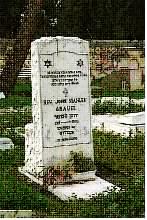
John Grauel had been a crew member of the famous Aliyah Bet ship the Exodus. He had been more than a crew member. It was his testimony before the United Nations Special Committee on Palestine that crucially tipped the scales for the United Nations Partition resolution creating Israel. Until his testimony, the committee refused to hear why the Jews were trying to get to Palestine. Golda Meir said about him, he did what no Jew could do. Because he was a Christian, and a minister of God, his testimony carried much more weight than the same testimony by a Jew.
The Hebrew on Grauels tombstone reads Yohanan ha Komer John the Priest. Grauel was not a priest. He was a Methodist Minister. In Hebrew there are no words to distinguish between different Christian religious leaders such as Priest, Minister, Reverend and Pastor.
Israels birth narrative pretty much omits recognizing and honoring non-Jews who did things that no Jew could do. It rubs against the pioneer myth of we did it all by ourselves. It is a failing that rightfully needs to be corrected.
David Parsons is the communications director of the International Christian Embassy in Jerusalem. They are not an Embassy of a country but an embassy of millions and millions of Christians who have a strong, religious based tie to support Israel. No country maintains an Embassy in Jerusalem today. No one is willing to recognize Jerusalem as the capital of the state of Israel and the center of the Jewish world. The International Christian Embassy in Jerusalem does, and does what no Christian country in the world will do, recognize Jerusalem as the eternal capital of the Jewish people.
When I told David about the Patterson project four years ago, his face lit up. The Patterson project was going to be the first time that the Jewish State was going to honor a Christian on a State level. It was very important. Immediately I realized it was a major opportunity for Israel.
Fundamentalist Christian Zionist supporters of Israel and Israel itself are under attack in the anti-religious secularizing world of the West. They need friends and we need friends. We need them and they need us for different reasons. Only the navest Israeli or Jew believes that Israel can go it alone against the U.N.. Europe with its resurfaced, anti-Semitism rupturing from historic roots and infected anew by a burgeoning un-assimilated Muslim population nurtured on hate, just cannot be ignored. Israel has considerable prowess and ability. But Israel is tiny. Israel needs monies, political support and military aid. Israel needs non-Jewish support and friendship.
I met Ronen Peretz, the Prime Ministers aide for the Patterson project, at the Crown Plaza in Jerusalem. Ronen did not know me nor had he communicated with me previously. I was just another outsider, another American interfering in their planning. Getting to him took back door maneuvering using friends of the Prime Ministers Chief of Staff. There were two messages to Ronen from an outside Israel view.
The first was that the Patterson story needs to be emphasized, as Patterson himself did to the world. Jews have a right to defend themselves. They have a need and a right to an army.
The second message was more difficult. The Patterson story is very important to Christians. They very much want to be included in the return when it happens. It was important to Israel and them in common because it was a Christian who was the father of the IDF. We have an opportunity to build stronger ties.
Ronen listened. I could tell he had been presented with a concept, a dimension of the Patterson story, an opportunity that had not been understood or considered Christian- Jewish commonality for Israel. It was not that he was against including Christians in the narrative being unfolded. It was that in the insular world of Jewish life and Israeli myopia he did not know how best to handle it. It was an internal political mine field for Israel. He, like most Israelis and Jews, did not know the story of Christian friendship for Israel. When it came to decision time, he made the right decision. The Christians were included.
The meeting ended with promises of being in open communication. I went back to the States and was again placed on a need to know basis only. Passover changed everything. Disaster struck. It was not to be the last disaster before Colonel Patterson could finally come home.
The Angelus Rosedale cemetery had been sold to new owners. The power of attorney and the documents we had submitted were reviewed by the new cemetery attorney. It was his opinion that Alan did not have authority over his grandparents cremains. I had the attorneys opinion reviewed by ours from the Ministry of Defense in New York. Victor sadly agreed. Alan, the way the law read, may not have the authority over the cremains. I got the email from Victor as I sat down with the family for the first nights Passover Seder. I would have to go to court in California to get Alan control of his grandparents cremains. If I failed, it was over.
As soon as Passover ended, I called my contact at the Israeli Consulate in LA. They could do nothing, or would do nothing. They knew no Zionist attorney I could call and had no budget to help. Shortly, they made things even worse. The entire Foreign Ministry, including the Consulate, went out on strike.
The Angelus-Rosedale attorney recommended an attorney I could hire. I called. He wanted a retainer of $10,000. It might be more, depending upon the amount of work.
Stewing on it overnight, I remembered a friend in Los Angeles. I had flown out to attend some of her programs and contributed to her efforts. Doris Wise Montrose is an incredible lady who runs, by virtual force of her being, an organization, Children of Jewish Holocaust Survivors. They are in the middle of the lunatic leftist, California Jewish liberal world an island of Conservative Jewish thought. They are supporters of Jabotinsky and Likud. I called Doris.
We talked. I told her about the project and the problem, emphasizing that everything must be kept quiet. We were doing everything under my name and my society, the Jewish American Society for Historic Preservation (JASHP). I would not attract attention. Israel would. Doris knew Israel has many enemies out there who haunt the courts.
JASHP would pay for an outside attorney if necessary, I told her. Surely there had to be a Zionist attorney in Los Angeles who would help us? Doris said she will get back to me.
Doris set to work making calls to her more ardent supporters, including a member of the California court. She was confident it would not be difficult to find a Zionist to represent us. Days went by. I called her.
She had contacted three solid Zionists. Not one of them got back to me. She was stunned. I was disappointed and prepared to hire the cemetery recommended attorney, time was running. There still was one person she could try she said. She asked me to be patient for one more day.
The next day, I was called by Myrna Strapp. She and her husband are attorneys in L.A. I explained the nature of the problem and shared with her what I needed to do. Myrna, without a moment of hesitation, said she will help. She and her husband are deep admirers of Jabotinsky. She quoted a few lines from Shmuel Katzs biography of Jabotinsky, Lone Wolf. Myrna told me she would represent us pro-bono because it is her privilege, her duty, to help as a Zionist. Her words were music to a heart already straining at how weak the support of American Zionists had become.
In the next few weeks, Myrna jumped in preparing the court papers and a petition to the Superior Court of California seeking a ruling on the meaning of California law. She interacted with Victor in New York. I connected her to Alan. The documents were prepared with my name as the lead. I covered the expenses. Buried in the documents was our plan to bring the cremains to Israel.
I kept Jerusalem apprised. Except for Ezekiel in Avihayil and Victor in New York, there was no response from Israel. We pushed ahead. My number at the Consul Generals office no longer worked. They were on strike.
Mid June we went to court. Myrna had prepared everything as best as she could. This type of law was not her neck of the woods. Myrna presented her petition. The judge considered the evidence, the question of law and the right of custody. He ruled... He ruled against us. We had lost.
Jerusalem was informed. We lost.
Prime Minister Netanyahu received two items of bad news that day. Three teenagers had been kidnapped and brutally murdered by Palestinian terrorists. And he was told we lost in court.
Myrna did not stop with the loss. Her redheaded temperament must have been set ablaze. She questioned the judge to the point of antagonism, why did he rule against us. His ruling did leave a small door open to appeal. She knew the next time, at the appeal process, we will have another judge. The next one will not be aware of what we are doing. Every point of objection would have a response.
The next time we could file was mid- July. She would be ready.
July 8, 2014.
Continued rocket attacks from Gaza into Israel, compounded by the murder of the three teens with fresh intelligence that Hamas had built an incredible labyrinth of death tunnels into Israel, made immediate action imperative. Hamas intended to emerge stealth-fully from the tunnels, killing as many Jews as possible. Women, children, old people, it did not matter to Hamas as long as they killed Jews.
Prime Minister Netanyahu ordered the Israel Defense Forces into action.
The Gaza war raged ferociously. It was a war of Jewish self-defense against Palestinian determined murderers indiscriminately raining thousands of missiles into Israel with no military objective except terror and death. The purpose that Colonel Patterson had spent his life fighting for was the right of Jews to defend themselves. Israel had an army. Israel was using that army.
A week later we went back to court. We had a new judge who heard the revised petition and weighed the evidence. The judge did not respond with a yes or no. She took her time and wrote out a three page opinion that considered the evidence. The weight of the evidence, the preponderance of the evidence that Myrna prepared, shifted the opinion of the new judge. She ruled in our favor. We had won.
The Prime Minister was informed by Ronen. In the midst of everything, the Prime Minister took a few moments to savor the victory in a faraway Los Angeles courtroom. Colonel Patterson was coming home.
Until Colonel Patterson was in Israel, anything could happen. Los Angeles has a large Muslim population who were celebrating the missiles from Gaza into Israel. They would not celebrate if they knew that the Godfather of the Israeli Army was coming home just at the moment when he was needed to help the Jews again. The strike at the Foreign Ministry had ended. We had help on the ground. We had to keep everything secret.
I informed Karen Washington that we had had a positive ruling from the court. She checked with her boss and we got the go ahead. I asked her to file the documents she needed to with the Los Angeles Health Department. She sent me the papers to sign. The Jewish American Society for Historic Preservation paid all the fees. Los Angeles OKd the papers for me to remove the cremains.
Alan was informed that we were transferring the cremains and would have a dignified program of reburial once the problems over there had settled down. He told me he understood.
Mid-August, Ezekiel and Ronen came to Los Angeles. Prime Minister Netanyahu had decided to commit ground troops to destroy the death tunnels into Israel that Hamas had built with so much diverted treasure and resources intended to help the Palestinian people. Netanyahu had no choice. He had to stop the missiles.
August 14
Ronen, Ezekiel, myself, the Consul General of Israel, David Siegel, joined 1,000 mourners at the Saban Theater in Beverly Hills. It was a service for Max Steinberg. Max was a Los Angeles Jew who had volunteered to the IDF. He felt it his duty, his responsibility to help defend the Jewish people from those who intended to kill them. Max became an elite member of the Golani 13 brigade. He was killed July 19 in Gaza when his armored vehicle was destroyed by a missile. Max was 24 years old. He was a Hayal Boded, a lone soldier.
Lone soldier are Jewish volunteers from around the world who come to Israel to be part of the IDF. They usually have no family in Israel. Their family in Israel is Israel. At Maxs funeral over 30,000 Israelis came to honor him. Max did his duty for the Jewish people everywhere. He paid with his life.
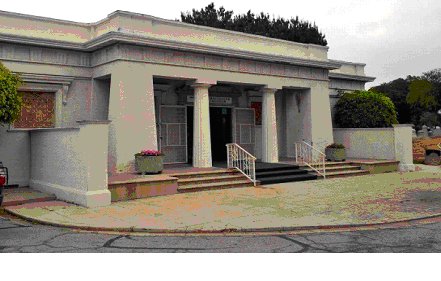
Columbarium
August 15, 8:30am
The next morning, all of us assembled outside the Columbarium at the Angelus-Rosedale cemetery. A small symbolic service was held to transfer the cremains to the Government of Israel. We all stood together between the flags of Israel and the United States. Ezekiel brought with him the flag of the Jewish Legion. A Consulate photographer took our pictures for the record. No speeches were made. They were not necessary. Emotion and meaning filled the air instead of words. The Diplomats took possession of the cremains and returned to the Consul Generals office on Wilshire Blvd.
The Colonel was under the protection of the Israeli government.
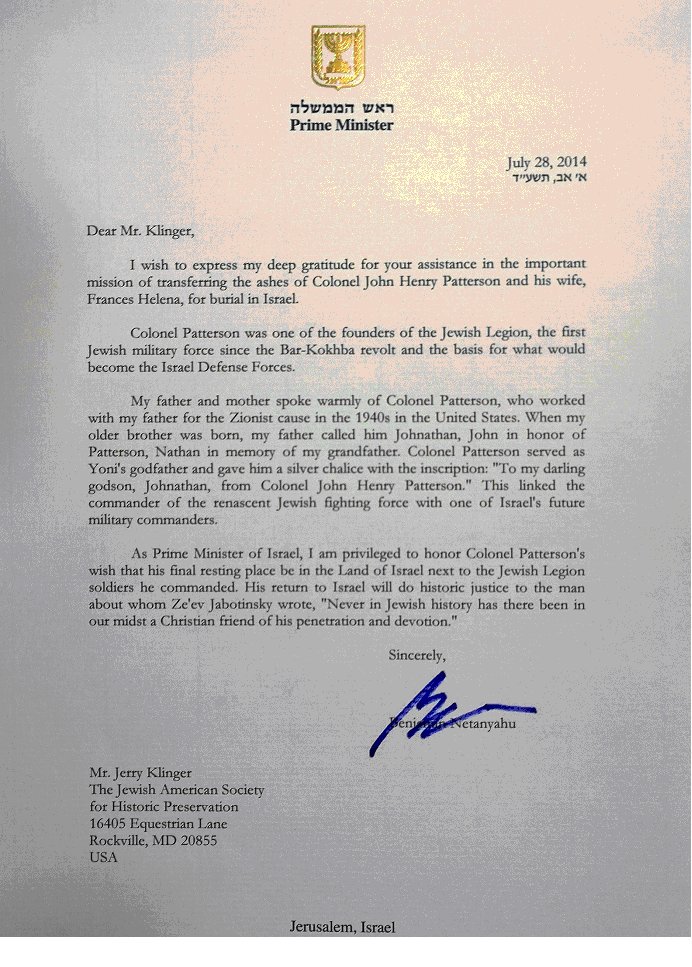
Later that afternoon, we had a small private meeting with David Siegel at the Consuls office. Myrna and I were presented with personal letters from the Prime Minister.
In the morning, Ronen and Ezekiel escorted the Colonel and Mrs. Patterson to Israel on an El-Al Jet. El-Al had the only non-stop flight to Israel. Air travel to Israel was just coming back. A few weeks earlier, the Federal Aviation Administration had banned all American air carriers from flying to Israel. The Europeans hurriedly followed suit. Ironically, Russian Airlines and Egyptian Air ignored the ban and continued flying to Israel.
The Colonel and Mrs. Patterson arrived on the 17th, Erev Shabbat. The War was still going on. The Ministry of Defense met Ronen and Ezekiel. We were told to wait quietly until instructions come from Jerusalem.
Two months later, to my surprise, the story was released to the media with a photograph taken outside the Columbarium of Israelis receiving the cremains. I had been cropped out. The Israeli media carried the story announcing that the reburial program will be early November. They described the return as entirely a Israeli project. I was irritated, chagrined and satisfied.
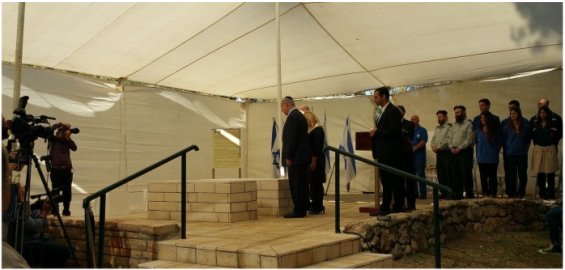
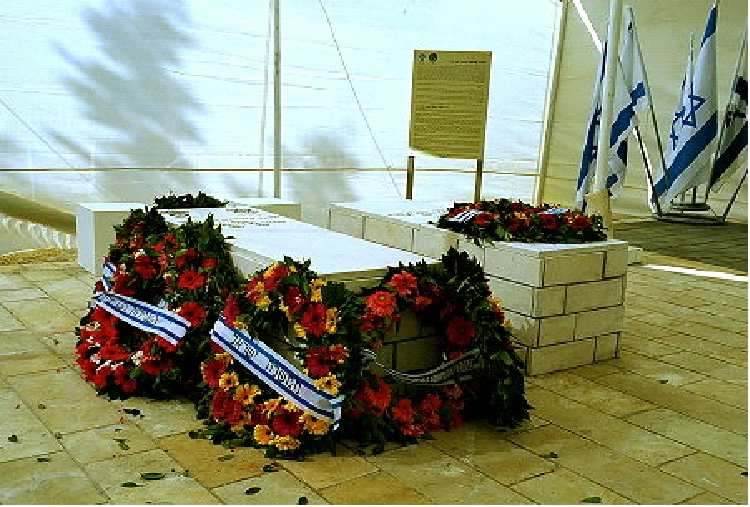
December 4, 2014 The Reburial
The return was a combined effort of Americans, Canadians, Israelis, Jews and Christians. Colonel Patterson rested at the head of the men he commanded. His wishes were fulfilled. The reburial, delayed quite a few times, was complete.
There were two ceremonies. The first was a small private one of about 75 special guests at the gravesite. The second ceremony was held at the Beit HaGedudim museum for a short list of 300.
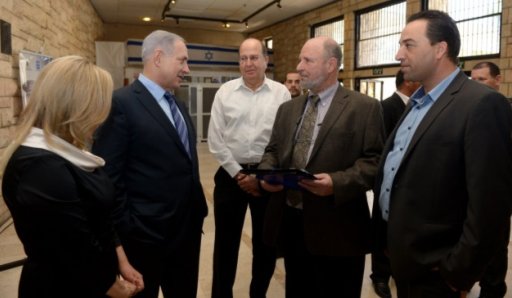
Between the two ceremonies, I had the opportunity to meet with the Prime Minister privately. Ronen had arranged the meeting so I could give the Prime Minister a series of recommendations to improve Israeli-Christian Zionist relations.
The Israeli media pretty much ignored the reburial program and its significance. Remembering the past to shape the future was old news that did not sell papers well. They had told the story, garbled and inaccurately, in October. They did not want to do it again, accurately.
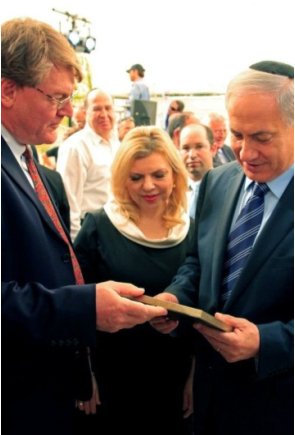
David Parson (ICEJ) Presenting Medallion to PM Netanyahu
There were successes and failures. The Christians were included at the ceremony. The International Christian Embassy presented a specially commissioned art work by the noted Israeli artist and sculptor Sam Phillipe to Prime Minister Netanyahu. It was a replica, in Gold and Silver, of the original Zion Mule Corps Medallion.
More International Christian Zionist organizations attended than International Zionist organizations. The British Zionists were proudly represented with dignity by Andrew Balcombe. The one failure I did have internationally was I could not get a single American Zionist Organization to attend or express any interest.
I sat behind the Prime Minister, the British Ambassador and the Irish Ambassador. The American Ambassador was unable to attend.
The opportunities that were opened, broadening the narrative and building fresh bridges of friendship, were only partially taken. The Prime Minister had to focus on reelection. His government collapsed the day before the program. New elections are called for March. Legitimately, attention to the opportunities opened by the Patterson reburial story will have to wait.
What will be the legacy of the Colonel Patterson return? Greater commonality and understanding with our friends in the non-Jewish world that has yet to be determined. The unreserved trumpeted responses to terrorism - we will defend ourselves -was heard loud and clear around the world.
Colonel Patterson must have smiled.
After sixty-seven years in Galut, Colonel and Mrs. Patterson had come home.
Jerry Klinger is the President of the Jewish American Society for Historic Preservation.
www.JASHP.org.
www.JASHP.org.
LEADING THE ‘NEW MACCABEES’: LT.-COL. JOHN HENRY PATTERSON
"Patterson was a friend of the Jewish people, and his role should be recognized – especially in times like ours, when support of Israel by non- Jews is very important."
Lt.-Col. John Henry Patterson. (photo credit: JABOTINSKY INSTITUTE IN ISRAEL)
Growing up as a Protestant in Ireland, John Henry Patterson read as a child the stories of biblical military heroes.
Years later, he became the commander of the Zion Mule Corps, the first Jewish military unit in nearly 2,000 years.
Years later, he became the commander of the Zion Mule Corps, the first Jewish military unit in nearly 2,000 years.
Biography - John Henry Patterson - Commander of the Jewish Legion - "Mad for Zion"
Colonel John Henry Patterson (1867-1947) was a pioneer Christian Zionist, commander of the Jewish Legion, British colonial soldier and administrator, author and friend of Zionist leaders. He was born Nov 10, 1867 at Forgney, Ballymahon, South County Longford, Ireland to a Protestant family. He left school at 16, but was very widely read, especially on the Bible and Jewish history. In March 1885 he joined the third Dragoon Guards, claiming falsely to be 19 years old, and in 1888 he was sent to India. In 1892, having attained the rank of Sergeant, he was transferred to the 16th Lancers in Lucknow. In 1895, he returned to England where he married Francie Helena Gray, a doctor in Law from North Belfast. In 1898 he undertook to oversee the building of a bridge in East Africa. The work was plagued by man-eating lions. Patterson killed the lions and wrote a book, The Man-Eaters of Tsavo, which brought him some fame. He retuned to the army to fight in the Boer war with a commission as a lieutenant, serving under Allenby. While he was serving in East Africa as a game warden, a fellow soldier under his command, Corporal Audley Blyth, died or committed suicide under mysterious circumstances. A son, Bryan, was born in March 1909, possibly to Byth's wife Ethel, who may have been Patterson's mistress. Bryan was raised by the Pattersons as their own son. Patterson was on the "retired" lists from 1908-1911. He left the army in 1911.
|  |
John Henry Patterson
|
Patterson rejoined the service in 1914, upon the outbreak of World War I, and saw service in Flanders. He was then sent to Egypt. In Alexandria, he met Joseph Trumpeldor and Zeev Jabotinsky who were attempting to form a Jewish military force.
| In 1915, Patterson was made commander of the approximately 750 man Zion Mule Corps, organized in Egypt in March. with a rank of "honorary Lieutenant Colonel." Swearing in the new volunteers on March 31, 1915, Patterson invited them to ‘Pray with me that I should not only, as Moses, behold Canaan from afar, but be divinely permitted to lead you into the Promised Land’. Of the training camp, he wrote, ‘never since the days of Judah Maccabee had such sights and sounds been seen and heard in a military camp - with the drilling of uniformed soldiers in the Hebrew language.'He landed with the corps at V Beach, east of Cape Helles, Gallipoli in April of 1915, after the Mule Corps personnel had been in training for only about three weeks. About half the Mule Corps personnel were seconded to the Anzacs, who treated them discourteously and had them shipped back to Alexandria. The 300 men under Patterson landed April 27 off the Dundrennon. The Zion Mule Corps served with distinction. Among the 300 men who saw action, there were 14 dead. Patterson told the Jewish Chronicle on September 15, 1915: ‘These brave lads who had never seen shellfire before most competently unloaded the boats and handled the mules whilst shells were bursting in close proximity to them … nor were they in any way discouraged when they had to plod their way to Seddul Bahr, walking over dead bodies while the bullets flew around them … for two days and two nights we marched … thanks to the ZMC the 29th Division did not meet with a sad fate, for the ZMC were the only Army Service Corps in that part of Gallipolli at that time.’ |  |
The Mule Corps was disbanded either in January or May of 1916. Patterson had fallen ill at the end of November and was evacuated to Alexandria and thence to London. Patterson returned to Ireland where he commanded the 4th Royal Irish Fusiliers and fifth Royal Dublin Fusiliers.
On July 17, 1917, he was made commander of the 38th Battalion of the Royal Fusiliers, one of three battalions of the Jewish Legion, recruited from British and foreign Jews. Patterson was promoted to full Colonel.
In February of 1918, Patterson proudly led soldiers of the 38th Fusiliers Battalion, one of the components of the Legion, in a parade in the Whitechapel Road, before they were shipped off to Palestine. They met a tumultuous and joyous reception among the Jews of London, as well as generating amazement among other bystanders, as related in this article about the parade of the Jewish Legion in London. t

Jewish Legion on parade under Col. Patterson in the Whitechapel Road, February 22, 1918.
It is falsely stated in several histories that the Jewish Legion never saw service in Palestine. It is true that British commanders were often anti-Semitic and tried to keep the Jewish Legion out of the fighting. Patterson and the 38th Battalion were kept out of the fighting in Palestine until June of 1918, when they arrived from Egypt and were stationed in Sarafend camp. They were then sent to relieve the Grenadier Guards in Jaljulya, and then attached to the 60th division and sent to the Jordan valley, where they formed a key pivot of the British line along the Melhallah rift. On September 19, 1918, the battalion crossed the river at Umm Es Shert. They advanced and held Es Salt in what later became Transjordan.
Following the armistice with Turkey on October 31, 1918, the 38th Battalion was sent to Rafa and Patterson was made commander of the Rafa area in February of 1919, commanding Sinai, Gaza and southern Palestine. In May of 1919 the 38th battalion was amalgamated with the 39th and 40th under the Lahore Division. It was renamed the "First Judeans" and assigned garrison duty in Palestine. In January of 1920 Patterson retired and was replaced as commander of the Judeans by Col. Eliezer Margolin. The Judeans were disbanded in 1921, after Margolin had used them to defend Jews under attack in Jaffa.
Patterson wrote two books about his experiences as commander of Zion Mule Corps and Jewish Brigade, With the Zionists at Gallipoli(1916) and With the Judeans in Palestine (1922).
Following the war, Patterson became active in supporting the Zionist cause in collaboration with his friend, Zeev Jabotinsky who had served under him in the Zion Mule Corps and Jewish Legion. Patterson was a very important part of a Keren Hayesod delegation in the United States in 1921-22, led by Jabotinsky. Jabotinsky wrote "I make the appeal for funds, then they begin the collection, and no one leaves the hall because they are waiting for Patterson to speak." (Katz*, pp 786-787)
In his preface to The Story of the Jewish Legion, Colonel John Henry Patterson wrote of Jabotinsky that his mentality was "void of the peculiar inhibitions of a Jewish mind influenced and twisted by the abnormalities of centuries of life in dispersion. That was probably the main reason why his political philosophy was so healthy and simple, and why, with all his tremendous popularity, he never became the recognized leader of the Jewish people." (Katz*, pp 1788)
Patterson also traveled to Palestine in 1933 at Jabotinsky's request and sat in at the Arlozoroff murder trial.
In 1934 Patterson sought and was granted a British disablement pension. He remained close to revisionist Zionist leaders. In 1936 and 1937 he traveled to Palestine to inspect Irgun forces there. In 1939 and 1940 together with Robert Briscoe and others, Patterson was involved in fund raising for the Irgun in the USA. In 1940, Jabotinsky and Patterson were trying to raise a Jewish army of 100,000 in the United States to fight Nazi Germany. The plan won support from
In 1940 he moved to California with his wife Francie. He was close to Ben-Zion Netanyahu, father of Benjamin Netanyahu. In 1947, he suggested the Irgun hit at British bureaucrats in Palestine. He died June 18, 1947. His wife died six weeks later in a California nursing home. Both were cremated and their ashes sent to Palestine, but their place of burial is not known. .
Ami Isseroff
Notes:
*Katz, Shmuel, Lone Wolf: A Biography of Vladimir (Ze'ev) Jabotinsky, New York 1995. Thanks go to Joe Hochstein for these quotes and information.
I am grateful to Tom Carew for supplying Patterson's service record, and to Steven Schoenherr for an article about the Zion Mule Corps http://history.sandiego.edu/gen/ar/340/zionmule.html. (Access Restricted)
Additional reading: http://www.jewishvirtuallibrary.org/jsource/History/gallipoli.html
Patrick Streeter, Mad for Zion: A Biography of Colonel J.H. Patterson, 2004.
1010101
John Henry Patterson, the 'godfather of the Israeli army', reinterred near Tel Aviv
ReplyDeleteAnglo-Irish adventurer led the first Jewish fighting force in two millennia
Lt Col John Henry Patterson
In a life crammed with swashbuckling incident, John Henry Patterson pursued causes from shooting man-eating lions to expanding the British Empire. But it was for his devotion to the founding of the state of Israel that he was honoured today.
The remains of the Anglo-Irish adventurer, who was by turns an officer, a big game hunter and a writer, were laid to rest alongside the Jewish soldiers whose bravery during the First World War played a role in turning him into an ardent Zionist.
The Israeli Prime Minister Benjamin Netanyahu, who attended the ceremony in Avihayil, north of Tel Aviv, paid tribute to Patterson as the “godfather of the Israeli army” because of his leadership of Jewish volunteers on the battlefields of Gallipoli and Palestine.
Israel.jpg
Benjamin Netanyhau and his wife Sara attend a ceremony to bury the ashes of Lt Col John Henry Patterson and his wife Frances Helena (AFP)
The moustachioed lieutenant colonel had come to British-controlled Palestine from east Africa after a colourful existence as a colonial officer, which included his famed dispatch of two 9ft-long lions. The creatures had turned into maneaters and threatened to halt construction of a railway bridge in present-day Kenya being overseen by Patterson.
After commanding a volunteer force which became known as the Jewish Legion during the war, Patterson paid glowing tribute to his men and became a committed supporter of the creation of a Jewish state. During his subsequent campaigning for the creation of Israel in New York, he became a close friend of Mr Netanyahu’s father, Benzion.
In a highly personal tribute, Mr Netanyahu said that Patterson, who became godfather to his elder brother Yonatan, had commanded the first Jewish fighting force in nearly two millennia.
Mr Netanyahu, whose brother died leading the daring Entebbe hostage rescue in 1976, said: “[Patterson] had absolute confidence that the Jews would make remarkable soldiers - not adequate soldiers, but remarkable soldiers. And I think he had a lot to do with that. He began the reconstitution of the ability of the Jews to defend ourselves.”
Israel-2.jpg
Ashes of British WW1 veteran hero Lt. Col. John Henry Patterson and his wife Frances Helena (AFP)
The reinterment of the ashes of Patterson and his wife Frances followed a three-year process to secure their removal from California, where the couple had lived until his death in 1947 - a year before the founding of Israel. Alan Patterson, the soldier’s grandson and his sole living descendant, said it had it had been one of his father’s dying wishes that he buried alongside Jewish Legion fighters he had once commanded.
Ashes of British WW1 veteran hero Lt. Col. John Henry Patterson and his wife Frances Helena (AFP)
ReplyDeleteThe reinterment of the ashes of Patterson and his wife Frances followed a three-year process to secure their removal from California, where the couple had lived until his death in 1947 - a year before the founding of Israel. Alan Patterson, the soldier’s grandson and his sole living descendant, said it had it had been one of his father’s dying wishes that he buried alongside Jewish Legion fighters he had once commanded.
Born in 1867 in Westmeath, Ireland, to a Protestant father and a Catholic mother, Patterson followed many of his compatriots in signing up for the British Army in search of opportunity and adventure.
He found that on the banks of the remote Tsavo River in Kenya at the turn of the 20th century where he was employed to oversee the construction of a bridge, and found his workers on the point of revolt as two rogue lions made repeated attacks on the encampment, claiming at least 28 lives.
Patterson, an archetypal Victorian colonialist who had previously honed his skills as a marksman by shooting tigers in India, spent months hunting down the two maneaters, finally shooting both in December 1898. Each lion required eight men to lift, and Patterson’s exploits were mentioned approvingly in the House of Lords.
His book about the incident became the basis for three Hollywood films, while his subsequent rumoured affair with the wife of a peer, during which the cuckolded baron died from a gunshot while all three were on safari, became the basis for short story by Ernest Hemingway.
While largely forgotten in Britain, Patterson continues to be regarded as a hero in Israel. Ze’ev Jabotinsky, one of the soldiers commanded by the Briton who went on to play an important role in the creation of the Jewish state, said: “In all of Jewish history we have never had a Christian friend as understanding and devoted.”